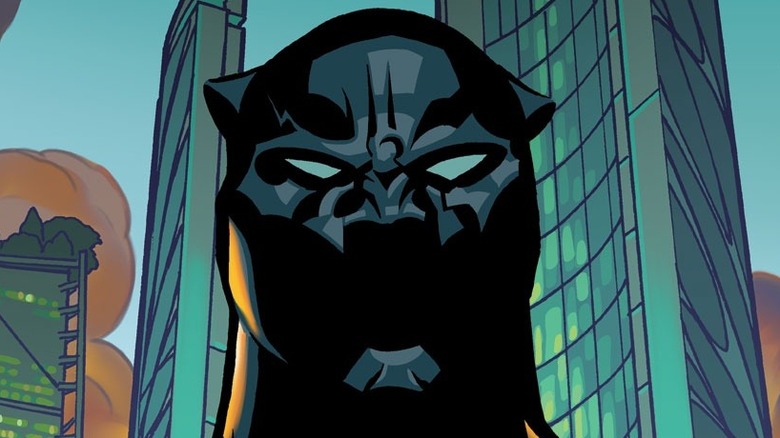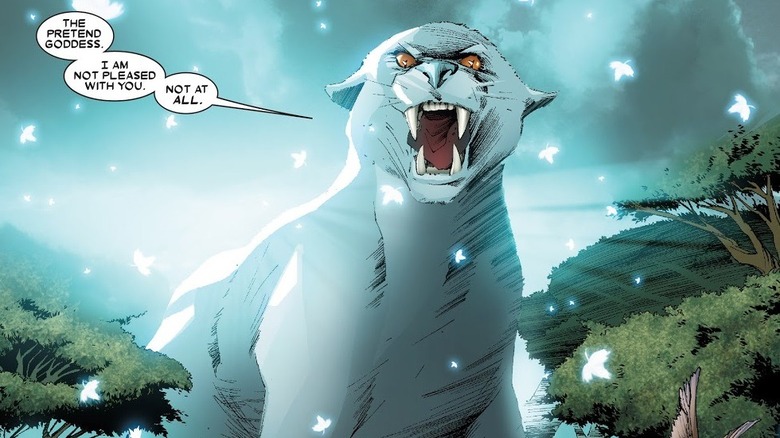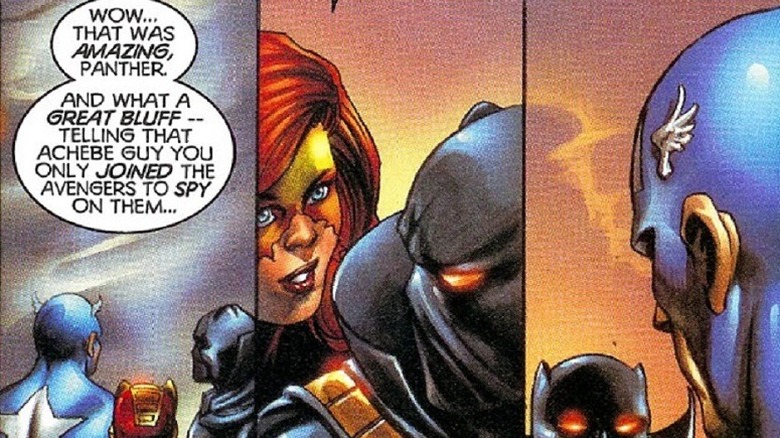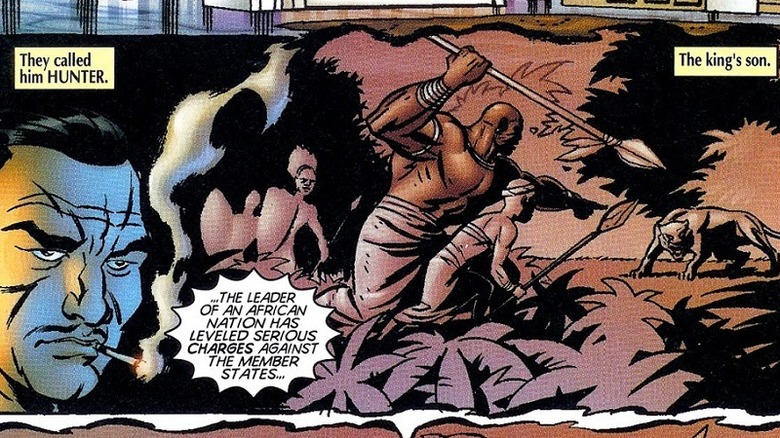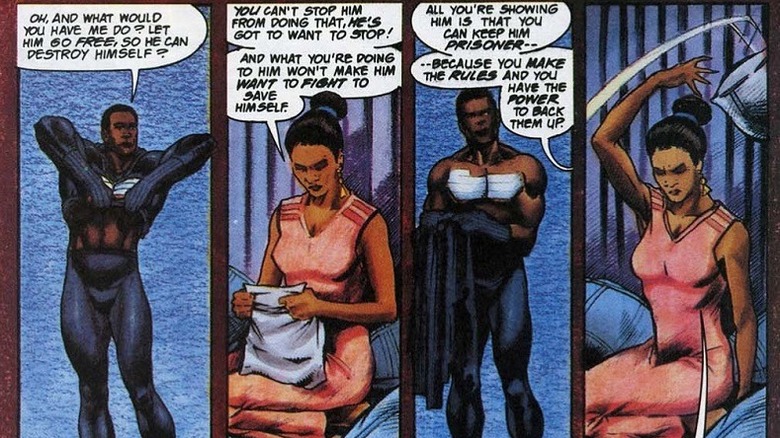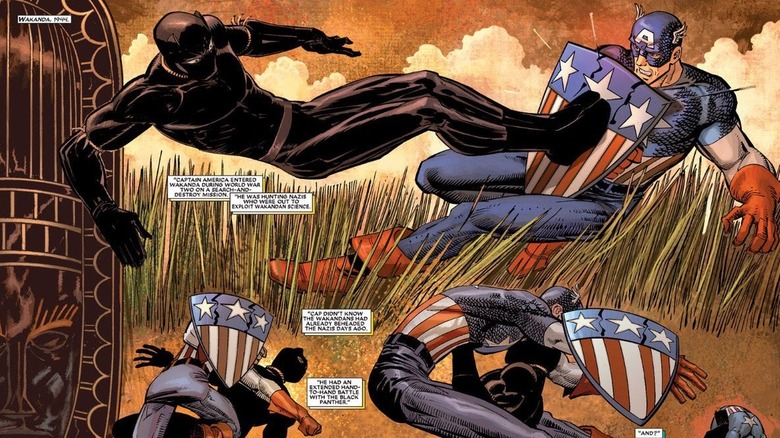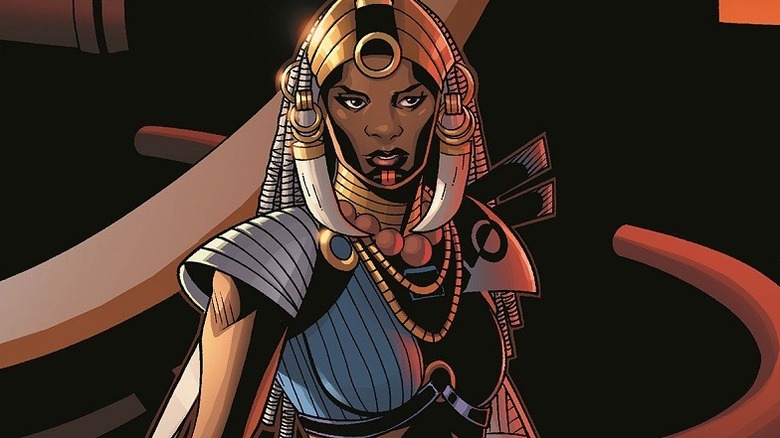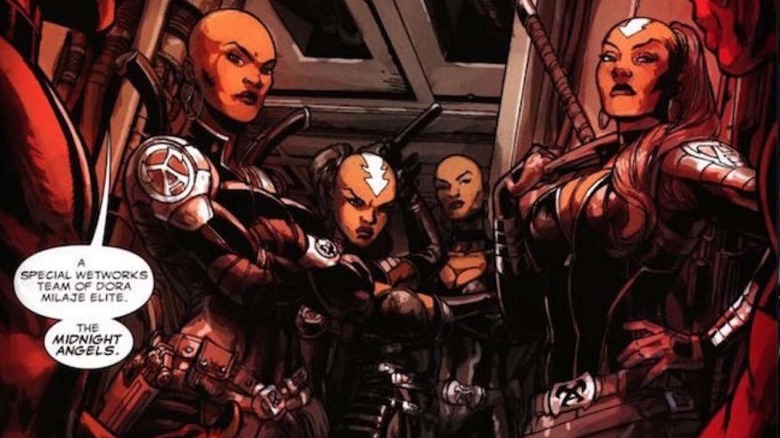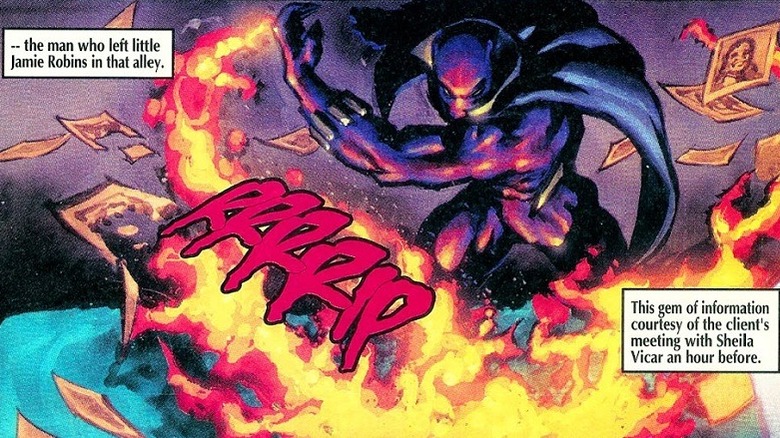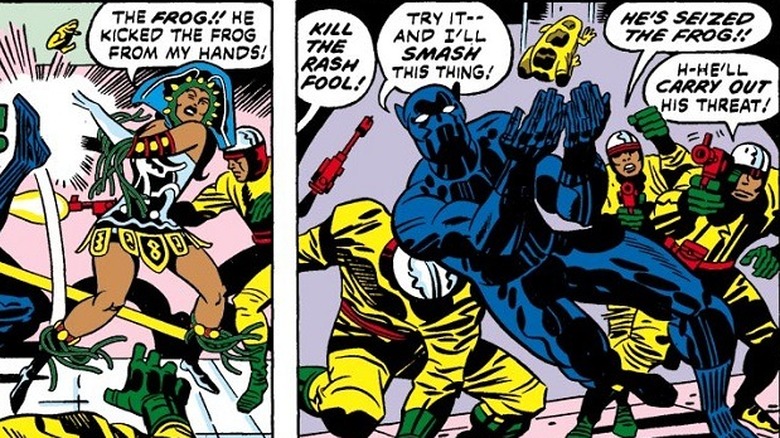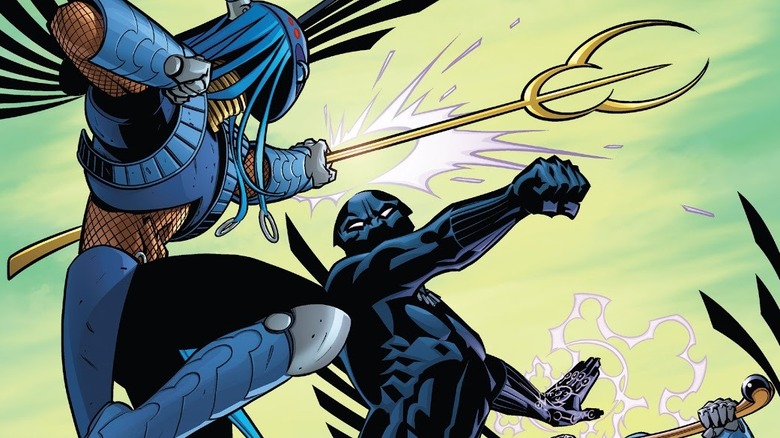Ways Marvel Lied To You About Black Panther
Black Panther blazed a one-of-a-kind trail as the first mainstream Black superhero in comics history. Soon after making his debut in 1966, he joined the Avengers, filling Captain America's temporarily vacated role as a costumed athlete. When he finally got his own feature series in 1973, his character, as well as the intricate politics and history of Wakanda, expanded rapidly. As the years have marched on, T'Challa's adventures have encompassed many different genres, eras, and approaches to continuity. Like most superheroes, his background has been subject to retroactive continuity changes, aka "retcons," which tend to tweak the details of a character's origin, powers, and family. Through retcons, T'Challa gained a stepmother, a sister, new powers, and completely rewritten motivations for his heroism. In many ways, retcons have made him who he is.
These changes have certainly made T'Challa considerably more complex. But every time Marvel has retconned something about the character, asserting that actually, T'Challa has always been like this, it has told a lie. Let's take a closer look at some of the ways Marvel has lied about Black Panther, from his reasons for joining the Avengers to the reality of the Panther God.
The Panther God gains a body and a name
The Panther God is first mentioned in T'Challa's second appearance, as are the rites and consumption of the Heart-Shaped Herb. Initially, the Panther God is not implied to be provably "real," let alone a being T'Challa has regular contact with. Even when he battles M'Baku, who wants to replace T'Challa's Panther God with the sacred White Gorilla, the Panther totem that crushes M'Baku seems to be a coincidence. Later, when the very real Lion God kidnaps T'Challa in order to end worship of the Panther God, the Avengers defeat him without any divine intervention.
A 1988 issue of "Black Panther" changed things forever by having the Panther God appear in physical form. The Panther God (referred to as the Panther Spirit here) is angry at T'Challa for not acting faster against the apartheid nation of Azania, and attacks T'Challa in the jungle. T'Challa convinces the Panther God he will fight against oppression with renewed vigor.
So we've got one lie-by-retcon already: The Panther God is real. Another arrived in 2009. When T'Challa is possessed by the Shadow King, Storm communes with the Panther God, who is suddenly established as Bast, the Egyptian goddess. T'Challa has been her servant all along, Marvel now insists. Who was he fighting in the jungle in 1988, then? There's no good answer.
Black Panther's motivation for joining the Avengers is completely rewritten
Captain America recruits Black Panther to the Avengers in a 1968 comic. The Panther helps save the Avengers from the Grim Reaper in his first adventure, and goes on to be an Avengers mainstay for a long time. He alternates between ruling Wakanda and serving with the team, and never seems to be anything less than a noble, loyal Avenger.
Years later, T'Challa deals with a complicated foreign incursion into Wakanda led by a psychotic villain named Achebe, partially funded by elements within the U.S. government. Achebe taunts the Panther, telling him he blends into the background as an Avenger. He further insults T'Challa by saying that the Avengers don't even address him as king, and wonders why he even bothered joining in the first place.
Flying in the face of everything fans then knew about his Avengers service, T'Challa tells Achebe that he initially joined the team to investigate it from within, in order to see if they posed a threat to Wakanda. In retrospect, it makes sense that he'd be careful in building such a major alliance, but it's utterly at odds with previous depictions of the character.
T'Challa gains a secret brother
For a long time, T'Challa was portrayed as the only son of King T'Chaka. However, Marvel wound up lying about this with yet another retcon. A 1999 comic reveals that T'Chaka's first son is Hunter, who was orphaned when his parents' plane crashed in a remote region of Wakanda. The husband and wife who found the baby were divided on what to do with him, and went to T'Chaka to decide the baby's fate. His response was to raise the child as his own son, naming him Hunter. Being white, Hunter, who is known as the White Wolf, is something of an outsider in Wakanda. He becomes close to the Queen Mother Ramonda as a result, as she is South African by birth.
When T'Challa comes along, Hunter feels intensely jealous of his younger brother. It doesn't help that T'Challa's mother N'Yami dies a week after giving birth. Hunter frequently finds himself needing to prove his worth to his father, eventually heading up Wakanda's brutal secret police, the Hatut Zeraze.
Ramonda is retconned as T'Challa's stepmother
In his debut, T'Challa talks about Ulysses Klaw killing his father, T'Chaka, which led to him becoming king at a fairly young age. However, T'Challa never mentions his mother. Years later, he receives an anonymous tip that claims his mother Ramonda has been seen in apartheid-era South Africa. T'Challa goes on a quest to find her, despite receiving a letter from her telling him to stay away. Eventually, T'Challa discovers she's being held prisoner by a high-ranking white supremacist named Anton Pretorius. Ramonda is a native of South Africa and an activist, and Pretorius kidnapped her at a protest she was leading.
Here's where things get screwy. T'Challa learns that his mother is alive in this story, which is itself a retcon. But he doesn't yet know something revealed as a result of an even later retcon: Ramonda is not his birth mother. T'Challa's mother N'Yami died shortly after giving birth to him, and Ramonda became his stepmother a few years later. Ramonda is officially reconned as T'Challa's stepmother in comics published years after her introduction. The storyline that does so even makes it seem like she might be betraying T'Challa out of bitterness as a result of her outsider status.
T'Challa is not the first Black Panther Captain America has met
Captain America first meets T'Challa in the pages of a 1968 issue of "Captain America." However, Marvel lied about this being Cap's first encounter with the Black Panther. A 2005 storyline reveals that Cap once met Azzuri the Wise, T'Challa's grandfather, who was the Black Panther during World War II.
When Cap investigates a mysterious region in Africa during the war, he finds the heads of German invaders on spears, courtesy of Azzuri. Sensing that he might have found an ally in the Black Panther, Cap asks Azzuri for more help against the Axis. Azzuri refuses, not trusting the Americans any more than he does the Germans. They do battle, and Azzuri wins. Azzuri asks Cap if he can give him a single reason why he should trust him. Cap thinks about it, and says he can't give him a reason. This is, in fact, exactly the response Azzuri wants. Thus, he teams up with Cap, Sergeant Fury, and the Howling Commandos to defeat an incursion from the Red Skull, Baron Strucker, and various super-soldiers.
Cap doesn't tell T'Challa about this encounter for many years. This doesn't really make much sense from a storytelling standpoint, but that's what happens when Marvel dramatically rewrites history and ends up lying about their own characters.
Shuri is a latecomer to the Black Panther mythos
Many of the retcons littering Black Panther's history at least attempt to make sense. Their revelations are often portrayed as hidden stories, or secrets that suddenly come to light. However, the introduction of T'Challa's younger sister Shuri, and much of the fourth volume of "Black Panther," totally revamped everything that came before. Suddenly, T'Challa gained a sister ... who had somehow never come up before.
Shuri, who made her debut in 2005, initially wants nothing more than to become the Black Panther. Much later, she does, in fact, take on the role. Shuri also dies for a time herself, but that's just an inconvenience for Wakandan monarchs. She returns to life quickly enough, and even helps convince the leaders of a rebellion to switch sides. Since her introduction, Shuri has been a mainstay in the Black Panther mythos. The popularity of the MCU's Shuri has cemented her place within it forever. She's so beloved, in fact, that many fans would be shocked to learn that she was retconned into existence fairly late in the game.
The Dora Milaje becomes an army
The Dora Milaje are introduced as two young women named Nakia and Okoye, who act as personal bodyguards to T'Challa. Historically, the Dora Milaje were chosen from different tribes to form a pool of potential wives to the king, which ensured national unity. The practice fell out of favor, but T'Challa reinstates it, sans the whole marriage thing: From his reign on, the Dora Milaje are strictly warriors. However, Nakia becomes obsessed with T'Challa after he kisses her under the influence of Mephisto. Eventually, she proves to be a traitor.
So, where's the lie? Well, what starts off as just two women is eventually retconned into a small army. By the time the 2016 "Black Panther" series debuted, the Dora Milaje's ranks had grown by leaps and bounds. Today, their numbers are dramatically larger, as are their resources. This series even sees the Dora Milaje undergo a revolution led by members Aneka and Ayo against their king. They're portrayed as having always held this exalted position, which makes their previous portrayal confusing, and a lie by default.
Black Panther gets some major upgrades with no explanation
In his 1966 introduction, it is noted that T'Challa possesses enhanced speed and senses that enable him to see in the dark and track his prey. However, he is otherwise portrayed as just a costumed athlete — with said costume getting ripped in a number of fights he engages in. Moreover, even though he's a technological genius who designed Wakanda's Techno-Jungle, as well as the Avengers' Quinjets, T'Challa never uses any of that tech as weaponry.
Black Panther's 1998 series retconned this forever. Here, T'Challa wears a vibranium-coated suit sporting anti-metal claws, vibranium energy daggers, and chameleon tech. He also has an extensive tech crew with him that disrupts Mephisto's energy fields so drastically, T'Challa can walk right up to him and punch him in the face. All of this is a huge retcon, which the MCU likely cemented for good. Where was T'Challa's tech during the first 30 years of his publication history? Best not to think about that one too hard.
A kinder, gentler, weirder Black Panther
Black Panther comes to the U.S. to confront the Ku Klux Klan and a group called the Warriors of the Dragon Circle in a 1976 storyline. After fighting the mysterious Soul Strangler and an agent named Wind Eagle who has stolen Wakandan technology, T'Challa is captured, tortured, and put in a death trap. Immediately after this, T'Challa reappears back in Wakanda with no explanation, going on wacky sci-fi adventures with bizarre treasure hunters like Mister Little.
Why, exactly, does the tone of T'Challa's adventures change so drastically? The reality is that Jack Kirby took over writing duties from Don McGregor. Kirby was clearly completely disinterested in McGregor's Klan storyline, preferring the kind of weird, over-the-top adventures that define his work. The entire tone of the character shifted as a result, in a way that makes no in-universe sense. Years later, the "Happy Panther" of the Kirby run was retconned as a future version of the character who travelled back in time.
Black Panther's fluctuating moral code
One of the things T'Challa's earliest appearances emphasize is his nobility, especially as an Avenger. His moral code initially seems similar to that of Captain America — he even criticizes Iron Man for threatening the life of Jocasta, a robot, in order to defeat Ultron.
In later years, however, his moral code is revealed to be very different indeed. In effect, T'Challa's more shocking actions mean Marvel lied to its readers about what he's truly capable of. What sort of actions are we talking about? Well, there's the 2000 story in which T'Challa nationalizes Wakanda's industries in an effort to flush out an enemy, sending the world economy into a tailspin. A 1988 arc sees him give respect to Dr. Doom as a fellow monarch. In a 2002 storyline, T'Challa threatens to wipe the Jabari tribe out. He sanctions the use of force against runaway Dora Milaje Ayo and Aneka in a 2016 tale. While he doesn't relish violence, T'Challa is fully prepared to use it to defend Wakanda in any way he sees fit. Regardless of one's feelings on this, one thing is clear: It's a massive retcon of the way the character was presented for years.
